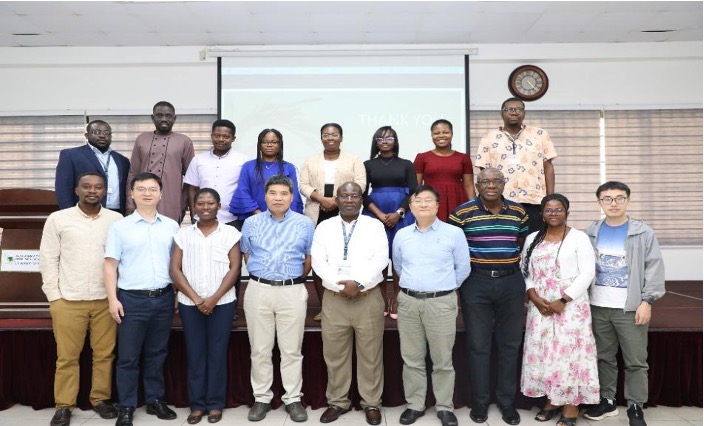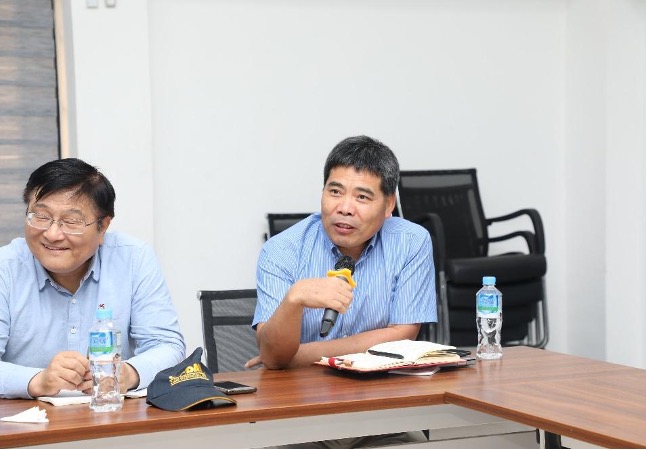The West Africa Centre for Crop Improvement (WACCI), University of Ghana is set to embark on a transformative collaboration with Zhejiang University, China, to revolutionize rice breeding efforts and combat food insecurity across Africa.
This was revealed during a recent visit and a high-level meeting between a delegation from the Zhejiang University and the team at WACCI.

Welcoming the delegation to Ghana and to WACCI, Prof. Eric Y. Danquah, the Founding Director of WACCI, introduced the scientists leading research and innovation in staple foods such as rice, maize, sorghum, tomato, cowpea, and cassava at WACCI.
In a brief presentation on how the Centre has fared over the past 16 years, he highlighted the trailblazing achievements of training over 100 Ph.D. graduates at WACCI, including the release of varieties in sorghum, sweet potato, cassava, and maize.
These accomplishments, he noted, demonstrate the potential of Africans to address food security challenges when provided with adequate training and opportunities.
Prof. Danquah also discussed WACCI's sustainability plan and emphasized the importance of supporting the Centre's USD 50 million endowment fund. He added that strategic partnerships and investments are crucial for achieving WACCI's goal of training Africans in Africa to enhance food security.

Professor Eric Y. Danquah, Founding Director, WACCI
While commending China's efforts in collaborating with African countries for mutual benefits, with Zambia being an exemplary case, Prof. Danquah called for further support to help Africa attain the Sustainable Development Goals.
Prof. Danquah bemoaned the seeming lack of innovation from some Ph.D. and Master’s programmes. “We need quality Ph.D. education for innovation. I am not happy when Ph.D. or Master’s programmes do not lead to innovations, so we need to look at how we can restructure our training system,” he said.
The Founding Director acknowledged the benefits of an exchange programme between WACCI and the Zhejiang University, which he believes will create opportunities for collaborations that will help to reshape the academic structure of WACCI and foster the generation of innovation in Ghana.
Speaking on behalf of the delegation from Zhejiang University, Prof. Qingyao Shu, the Deputy Director of the Institute of Crop Science, revealed his team's intention to conduct multi-locational trials in Ghana for the ‘indica-japonica’ rice hybrid varieties they have developed to observe how they adapt to the Ghanaian environment.
He outlined their plans to assess the response of the ‘indica-japonica’ hybrid to biotic stresses such as the rice yellow mottle virus to enable them to integrate genes that will improve its resistance.
Prof. Shu stated, “I am sure that they do not carry any resistant genes to the virus,” while hoping that the collaboration would be an investment in this hybrid which would improve the quality of the hybrid rice.
To facilitate collaboration and knowledge exchange, Prof. Guoping Zhang, Director of the Institute of Crop Science and leader of the Zhejiang team proposed the establishment of a split-site training programme between WACCI and Zhejiang University, allowing students to learn from scientists and researchers in both institutions.

(Left-Right) Professor Guoping Zhang and Professor Qingyao Shu
WACCI's Rice Scientist, Dr. Mavis Owusuaa Osei-Wusu, for her part, provided an overview of the Centre's rice breeding programme. She highlighted Ghana's heavy reliance on rice imports and the need to reduce importation to strengthen the Ghanaian economy.
Dr. Osei-Wusu mentioned low yields, competition from imported varieties, high fertilizer costs, and biotic stresses as challenges faced by rice farmers and scientists in Ghana. She, however, disclosed that WACCI is actively seeking solutions to these challenges through the Centre’s rice breeding programme and cutting-edge research.
She also emphasized the need to identify target genes for abiotic and biotic stress tolerance in developing improved rice varieties and expressed her confidence in the collaboration between WACCI and Zhejiang University. Dr. Osei-Wusu added that the collaboration would not only introduce enhanced rice varieties but also help expand research expertise in rice breeding, thereby playing a crucial role in boosting rice production in sub-Saharan Africa.
The meeting was attended by industry representatives, including Mr. Gerald Sowah, co-owner of Flamingo Rice Company, Mr. Young Pang, Head of (Grains, Fruits & Vegetables) Business Division, TIAST Group, and Mr. Jiarun Zhang, PhD Candidate from Zhejiang University.
WACCI's key personnel, including Dr. Daniel Dzidzienyo, Dr. John S. Y. Eleblu, Dr. Agyemang Danquah, Dr. Theresa Ankamah-Yeboah, Dr. Pearl Abu, and other administrators and staff members, actively participated in the meeting.
